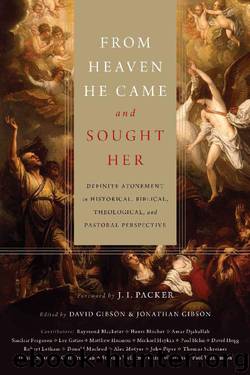From Heaven He Came and Sought Her by David Gibson & Jonathan Gibson

Author:David Gibson & Jonathan Gibson [Gibson, David]
Language: eng
Format: epub
ISBN: 9781433512780
Publisher: Crossway
Published: 2013-11-29T16:00:00+00:00
I. The Saving Work of God Is Indivisible
TITUS 3:3–7
For we ourselves were once foolish, disobedient, led astray, slaves to various passions and pleasures, passing our days in malice and envy, hated by others and hating one another. But when the goodness and loving kindness of God our Savior appeared, he saved us, not because of works done by us in righteousness, but according to his own mercy, by the washing of regeneration and renewal of the Holy Spirit, whom he poured out on us richly through Jesus Christ our Savior, so that being justified by his grace we might become heirs according to the hope of eternal life.
In Titus 3, Paul temporally locates God’s salvation in the three moments of redemption accomplished, applied, and consummated. The moment of redemption accomplished is explicit and is denoted by the temporal adverb ὅτε (“when”; v. 4), which qualifies the main verb ἐπεφάνη (“appeared”).14 God’s “goodness and loving kindness” (χρηστότης καὶ φιλανθρωπία15) refer here to Christ’s first appearance, in which he “gave himself for us to redeem us from all lawlessness” (2:13–14). Syntactically, the verb ἔσωσεν in 3:5 is the center point of verses 3–7: “all that leads up to the verb and flows from it enters into the understanding of what is intended by it.”16 The preceding ὅτε clause is tied syntactically to this main verb in a protasis–apodosis relationship: when Christ appeared the first time to die and rise, God saved (ἔσωσεν) us (v. 5).17
Paul introduces the next (implied) moment of redemption applied in a prepositional phrase that is connected to the main verb ἔσωσεν: God saved us “by the washing of regeneration and renewal of the Holy Spirit” (διὰ λουτροῦ παλιγγενεσίας καὶ ἀνακαινώσεως πνεύματος ἁγίου).18 The first pair of genitives focuses on the need for washing; the second pair of genitives, on the need for renewal. Together, the bathing of regeneration and renewal of the Holy Spirit envisage transformed human existence, a point in time that can have occurred only during our own lifetime experience.
In verse 7, Paul hints at the final moment of redemption consummated: ἔσωσεν is tied syntactically to a purpose clause in verse 7, which orients us toward the future. The purpose of God’s salvific act in Christ and the Spirit’s regeneration is “so that [ἵνα] being justified by his grace [δικαιωθέντες τῇ ἐκείνου χάριτι], we might become heirs [κληρονόμοι] according to the hope of eternal life [ἐλπίδα ζωῆς αἰωνίου].” “Heir” suggests an “anticipatory position,” and “hope of eternal life” speaks of “a future unending life with God.”19
So, in Titus 3, Paul locates God’s salvation in three moments: the moment of redemption accomplished, when Christ appeared in history; the moment of redemption applied, when the Holy Spirit regenerates and renews us in our own lifetime experience; and the moment of redemption consummated, the hope of eternal life.
Continuing with the Titus text, we observe that these three moments of God’s salvation are distinct but integrally connected. Paul maintains a distinction between the three moments and does not collapse one into the other.
Download
This site does not store any files on its server. We only index and link to content provided by other sites. Please contact the content providers to delete copyright contents if any and email us, we'll remove relevant links or contents immediately.
The Secret Power of Speaking God's Word by Joyce Meyer(3220)
Signature in the Cell: DNA and the Evidence for Intelligent Design by Stephen C. Meyer(3138)
Real Sex by Lauren F. Winner(3023)
The Holy Spirit by Billy Graham(2953)
The Gnostic Gospels by Pagels Elaine(2531)
Jesus by Paul Johnson(2362)
Devil, The by Almond Philip C(2332)
23:27 by H. L. Roberts(2251)
The Nativity by Geza Vermes(2230)
Chosen by God by R. C. Sproul(2164)
All Things New by John Eldredge(2162)
Angels of God: The Bible, the Church and the Heavenly Hosts by Mike Aquilina(1969)
The Return of the Gods by Erich von Daniken(1946)
Angels by Billy Graham(1926)
Knowing God by J.I. Packer(1859)
Jesus of Nazareth by Joseph Ratzinger(1811)
The Gnostic Gospel of St. Thomas by Tau Malachi(1799)
Evidence of the Afterlife by Jeffrey Long(1790)
How To Be Born Again by Billy Graham(1782)
